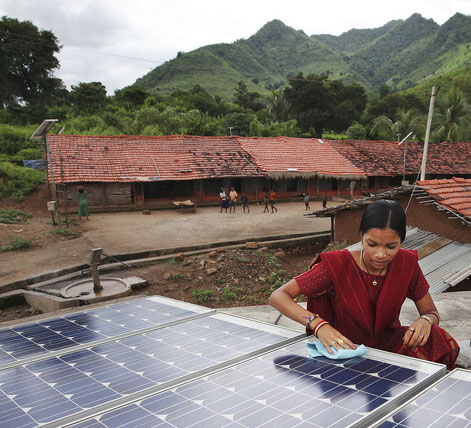I’ve been a Senior Economist in DFID for just over a month. Many friends and colleagues are excited about my new role…even people I don’t know that well. My first challenge has been giving a clear answer to the question “what do you ACTUALLY DO?”. Most people know what doctors, engineers, lawyers, even bankers and accountants do. But they know very little about economists.
“what do you ACTUALLY DO?”
It was much easier in my previous job as a UK climate change negotiator. I only had to mention Bali or Copenhagen for people to have an idea what I did. I would then add “I’m responsible for negotiating how much money developing countries should get to help them tackle climate change” – and people would smile and remark how interesting that must be. I would liven up discussions by describing situations that had led seasoned civil servants to break down in tears, or a senior delegate to draw blood from her hand in the midst of a negotiating round. I’d talk about staying up night after night arguing over tiny words or sentence construction, all with occasional results and lots of frustration…easy! Even being a co-author of the Stern Review of the Economics of Climate Change (my job prior to joining the UK’s negotiating team) was fairly easy to describe. I’d just say that I’m helping the (then) government’s chief economist write a book. Enough said.

But what now? The received wisdom is that you need to be able to describe what you do in one sentence to a stranger in a lift…otherwise you’re lost.
Me: I work on climate change economics in DFID.
Stranger in lift: Climate change. Not sure I’m convinced of the science.
Me: I’m not a climate change scientist. I work on the economics of climate change – how much it costs to take action or not take action.
Stranger in lift: Oh… (looking confused)
Me: But not in an abstract way – though I do commission some research, yes – but mostly I advise developing countries on what to do about climate change.
Stranger in lift: So you tell developing countries what to do? Surely that’s not morally right? They didn’t cause the problem.
Me: Well, many governments actually seek DFID’s advice and funding to help with issues like this (stranger smiles politely and breathes a sigh of relief as the doors open to let us out) and taking action might be in their interest anyway (I trail off)…nice to meet you anyway, bye…
Hmm. Perhaps not the simplest of explanations.
But there is help out there for me. In particular, the new trend, prompted by the financial crisis, to re-examine the “fundamentals” of economic growth. Dambisa Moyo’s recent book “How the West was Lost” is one key example. I’m not going to review it here, but she helpfully reminds readers that economics is fundamentally about how three inputs – capital (infrastructure, machinery, etc), labour (people), and productivity (technology, innovation) – can combine to make societies better off in the long-term, and deliver many out of poverty.
Put simply, my job is about making sure – in a practical way – that UK aid helps countries achieve gains in these three inputs, at the same time as reducing their emissions and building resilience to climate problems like droughts or floods. It’s about improving UK aid.
There are some people who are unsure whether my job makes sense. No one country has demonstrated that simultaneous growth and climate action is possible. Some even think it is impossible theoretically – they say economic growth is fundamentally linked to the use of carbon-intensive fossil fuels. But Japan, for example, enforced strong energy efficiency policies, particularly up to the 1990s, meaning its primary energy consumption per unit of GDP is almost the lowest in the world. China appears to be using renewable technology development to drive its growth. Others, like my lift friend, think developing countries shouldn’t do anything to tackle climate change – they just need money to help them adapt to the inevitable.
These are all reasonable points that I will take very seriously in my new job. But I will also review the economics, look for the evidence, and test new approaches and ideas. I’ll also keep reminding detractors of the Stern Review finding that unabated climate change is inconsistent with long-term economic growth – shaving off 5-20% of global GDP. Enough said, for now!
